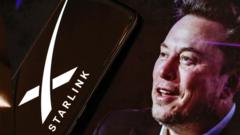Following the conviction of Andrew McIntyre for his role in UK riots, Elon Musk's comments about the sentence have raised eyebrows, linking him to an alarming trend of far-right rhetoric in his recent statements.
Elon Musk Sparks Controversy Over Sentence of British Extremist

Elon Musk Sparks Controversy Over Sentence of British Extremist
After the sentencing of a neo-Nazi for inciting riots in the UK, Elon Musk faces backlash for criticizing the judicial decision on social media.
Article Text:
In the wake of last summer's riots in the UK, a prominent extremist, Andrew McIntyre, has been sentenced to seven years in prison after his actions incited violence. McIntyre, 39, was found guilty of promoting disorder through his Telegram channel, "Southport Wake Up," where he spread vitriolic anti-Islamic, antisemitic, and anti-immigrant messages. This platform was utilized to rally individuals following a tragic knife attack in Southport, with McIntyre encouraging direct action against a local mosque.
Elon Musk, the tech billionaire and owner of the social media platform X, made waves with his online commentary about McIntyre's sentence. Following the verdict, Musk denounced the seven-year term as excessive, arguing that those who imposed such a sentence should themselves face consequences. His tweet has amassed over 34 million views, igniting discussions around his growing alignment with far-right sentiments in recent weeks.
Commentators have voiced concerns about Musk’s emerging trend of defending right-wing figures and espousing their views, which has been increasingly reflected in his social media activities. Joe Mulhall from the advocacy group Hope Not Hate highlighted the extremities of those Musk engages with, underscoring the danger of normalizing such rhetoric in society.
The case continues to draw attention not only for the actions of McIntyre but also for the broader implications of influential figures like Musk entering debates on legal proceedings related to extremism, emphasizing the urgent need to address far-right ideology in political conversations.
In the wake of last summer's riots in the UK, a prominent extremist, Andrew McIntyre, has been sentenced to seven years in prison after his actions incited violence. McIntyre, 39, was found guilty of promoting disorder through his Telegram channel, "Southport Wake Up," where he spread vitriolic anti-Islamic, antisemitic, and anti-immigrant messages. This platform was utilized to rally individuals following a tragic knife attack in Southport, with McIntyre encouraging direct action against a local mosque.
Elon Musk, the tech billionaire and owner of the social media platform X, made waves with his online commentary about McIntyre's sentence. Following the verdict, Musk denounced the seven-year term as excessive, arguing that those who imposed such a sentence should themselves face consequences. His tweet has amassed over 34 million views, igniting discussions around his growing alignment with far-right sentiments in recent weeks.
Commentators have voiced concerns about Musk’s emerging trend of defending right-wing figures and espousing their views, which has been increasingly reflected in his social media activities. Joe Mulhall from the advocacy group Hope Not Hate highlighted the extremities of those Musk engages with, underscoring the danger of normalizing such rhetoric in society.
The case continues to draw attention not only for the actions of McIntyre but also for the broader implications of influential figures like Musk entering debates on legal proceedings related to extremism, emphasizing the urgent need to address far-right ideology in political conversations.



















